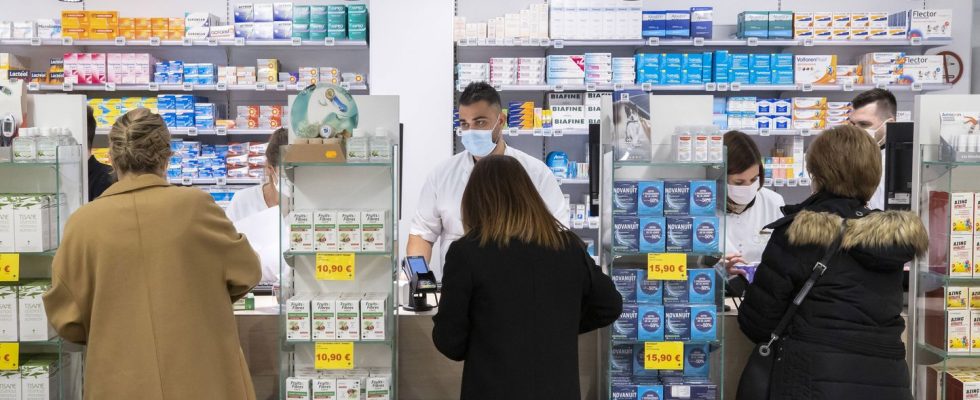The scene happened three years ago but he remembers it like it was yesterday. Christophe Le Gall, an Angevin pharmacist, is working in his pharmacy when he sees a man, visibly unhappy that the practitioners are not moving quickly enough for his liking. When he arrives at the counter, he explains that he wants to be vaccinated against Covid-19 but does not have his Vitale card with him. The pharmacist therefore refuses to inject him. The customer gets angry, the tone rises, the insults fly. Christophe Le Gall leaves his shop to calm him down. The man pushes him and the pharmacist falls heavily and finds himself on the ground. A scene far from exceptional.
The attack on the Angevin pharmacist is one of the 584 reported to the National Council of the Order of Pharmacists in 2021. The institution published this Tuesday its annual barometer of the safety of pharmacists’ practice. In 2023, 475 attacks were reported, an increase of almost 30% compared to 2022.
While it is difficult to say whether attacks have truly increased or whether pharmacists are just talking about them more, according to several pharmacy owners, incivility is becoming more and more frequent.
Physical attacks, insults and threats
Among the violence recorded, physical attacks, insults or threats. “We are regularly insulted,” says Christophe Le Gall, Angevin pharmacist and president of the National Union of Pharmacists of France (UNPF). “Assaults happened to me, of course, like everyone else,” says Gildas Bernier, security referent for the National Order of Pharmacists and owner of a pharmacy in the Nevers area.
The period of the Covid pandemic was particularly dense in terms of attacks. In 2020, 584 cases were reported to the Order, compared to 303 the previous year. “We saw four times as many people and some were anxious and immediately wanted to be vaccinated or tested even though there were a lot of people,” recalls Christophe Le Gall.
Pickpocketing
But pharmacists are also faced with another type of violence: theft. Last June, Christophe Le Gall’s pharmacy, located in the city center of Angers, was burglarized four times in the same week. “They had obviously passed the word around. »
Pierre-Olivier Variot, president of the USPO and pharmacist in Dijon, explains that he has received numerous feedback on this subject. “Colleagues showed me videos of people who entered a pharmacy, took a basket, filled it with products, slowly approached the door before running and throwing themselves into a car waiting for them in front. »
Violence often linked to a refusal of delivery
Refusal of dispensation, difficulty in providing care, shortage of medicines, waiting times, Covid diagnostic test… There are many reasons for tension. According to the Order’s barometer, physical attacks most often result from a refusal of delivery, whether linked to an expired prescription or falsification.
“Many people falsify prescriptions to get medicines, particularly opioids or expensive products,” emphasizes Pierre-Olivier Variot. When we refuse to give it to them, they sometimes become aggressive. » The pharmacist paid the price. “A patient to whom I had refused to give medication because the prescription was wrong started screaming. I stood away from her to tell her that I would not follow up but that if she wanted to file a complaint, she could. »
“An aggressiveness that did not exist ten years ago”
But some cases are a little more delicate. This is particularly the case for patients who cannot obtain their treatment due to stock shortages. “When a patient on cancer medication asks me if he will have it next month and I tell him that for the moment I cannot order it, it can make him aggressive,” says Pierre-Olivier Variot. “If I do not condone their violence, their anguish is legitimate. »
According to the president of the UNPF, the role of pharmacists has changed significantly in recent years. “We have become the sentinel of health. We have to face an aggressiveness that did not exist ten years ago. »
Faced with these attacks, everyone tries to organize themselves as best they can. “When I feel that tension is starting to rise between a person and my colleague, I try to take over,” explains Gildas Bernier. The pharmacist also tries to be an educator. “If we explain the rules of the code of ethics, the majority of people understand. »
Other practitioners resort to outside help. Christophe Le Gall, for example, hired a security guard who monitors the pharmacy in the evening and on Saturdays, “during peak hours”. But this solution has a cost that “only large pharmacies can afford”, according to Pierre-Olivier Variot.
Train yourself in conflict management
Another solution is to train practitioners. “I had my entire team do training on conflict management,” says the Dijon boss. The goal: to teach them to anticipate the risks of violence and to implement a de-escalation process. The University of Angers has integrated this issue into its curriculum.
“This is a subject that is taking up more and more space within the Order and we want to do everything we can to help the victims,” assures the security referent of the institution. Referents are also present in each department to support pharmacists who have been attacked and who feel the need.
And then, there remains justice. The three pharmacists encourage their colleagues to file a complaint. “This often results in nothing but it is important to do so that the police can add to their files and, ultimately, identify the perpetrators,” believes the president of the UNPF. And sometimes it succeeds. The man who attacked him in 2021 was sentenced to four months in prison.

